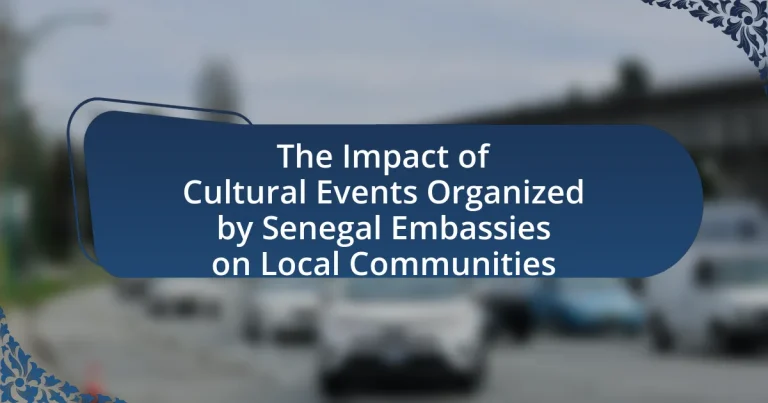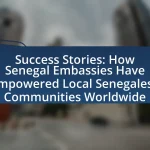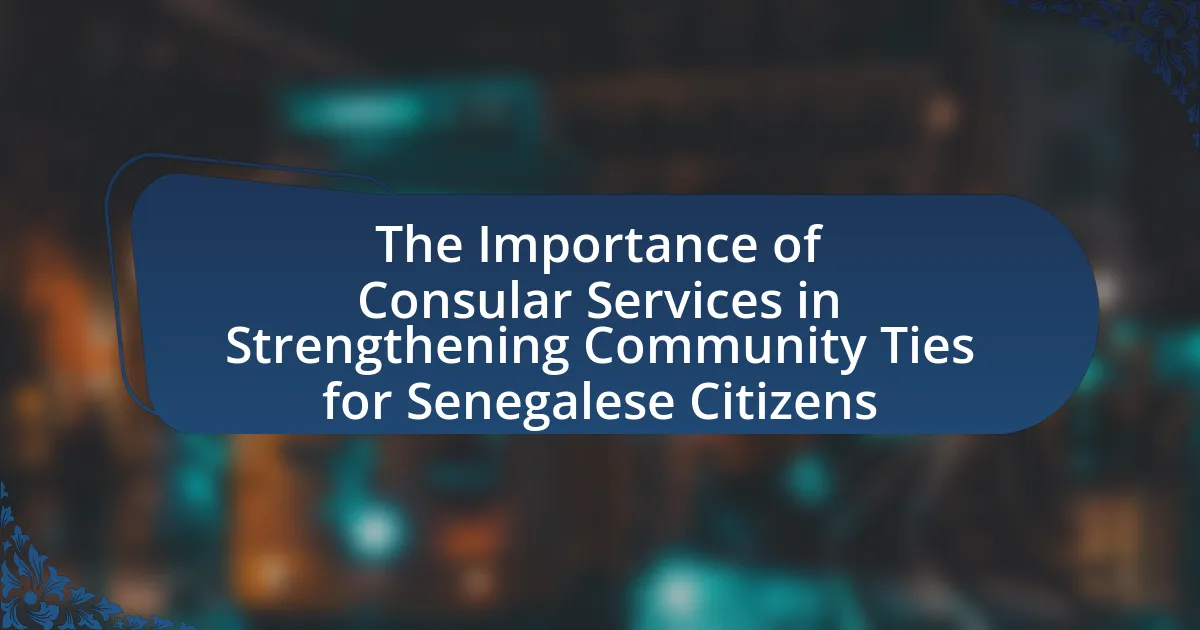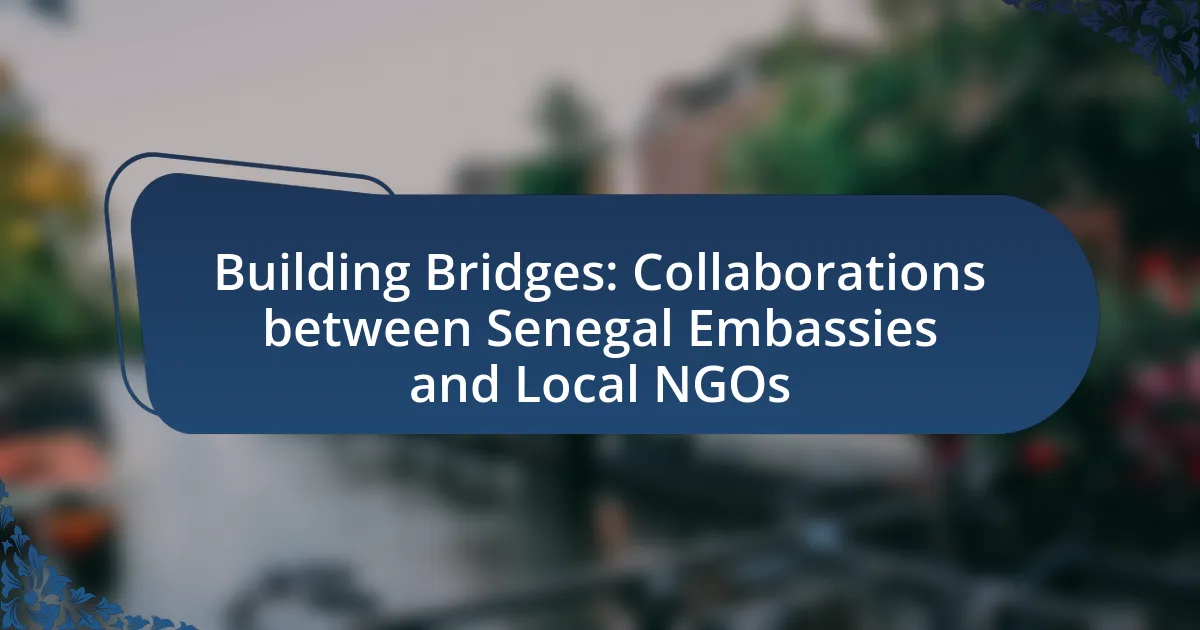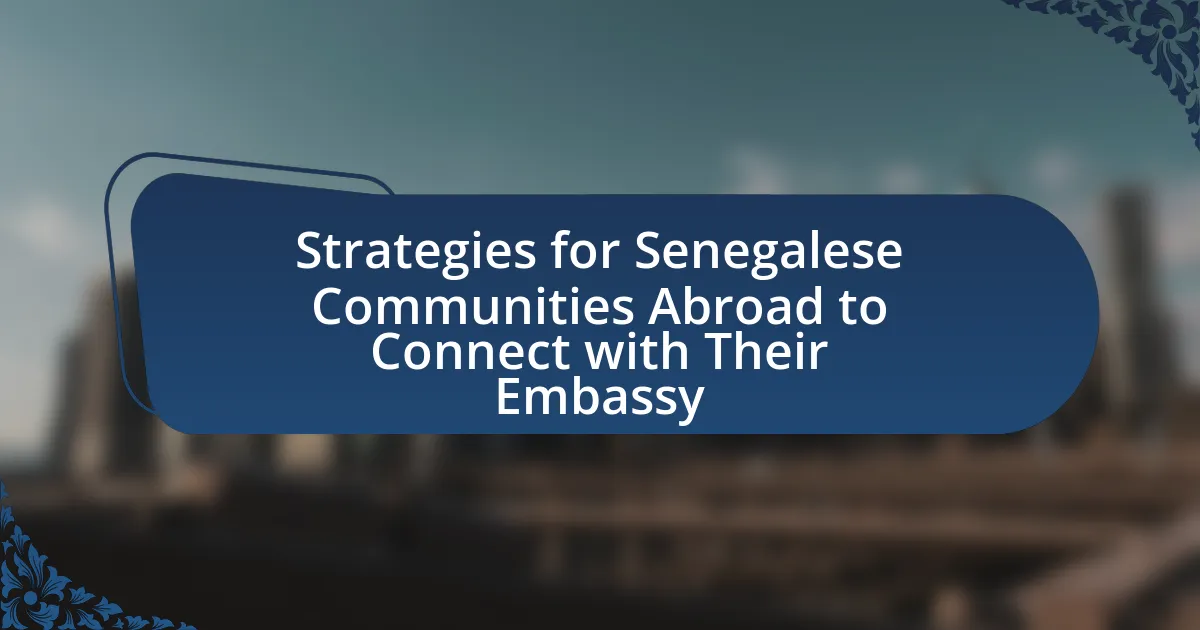Cultural events organized by Senegal embassies play a significant role in enhancing local communities by promoting Senegalese culture and fostering intercultural dialogue. These events, which include art exhibitions, music festivals, and culinary showcases, serve to strengthen community bonds, boost local economies, and preserve cultural heritage. The article examines how these events reflect Senegalese identity, the challenges faced in organizing them, and the strategies that can improve community engagement and participation. Additionally, it highlights the economic benefits and the impact on tourism, emphasizing the importance of effective marketing and feedback for future event success.
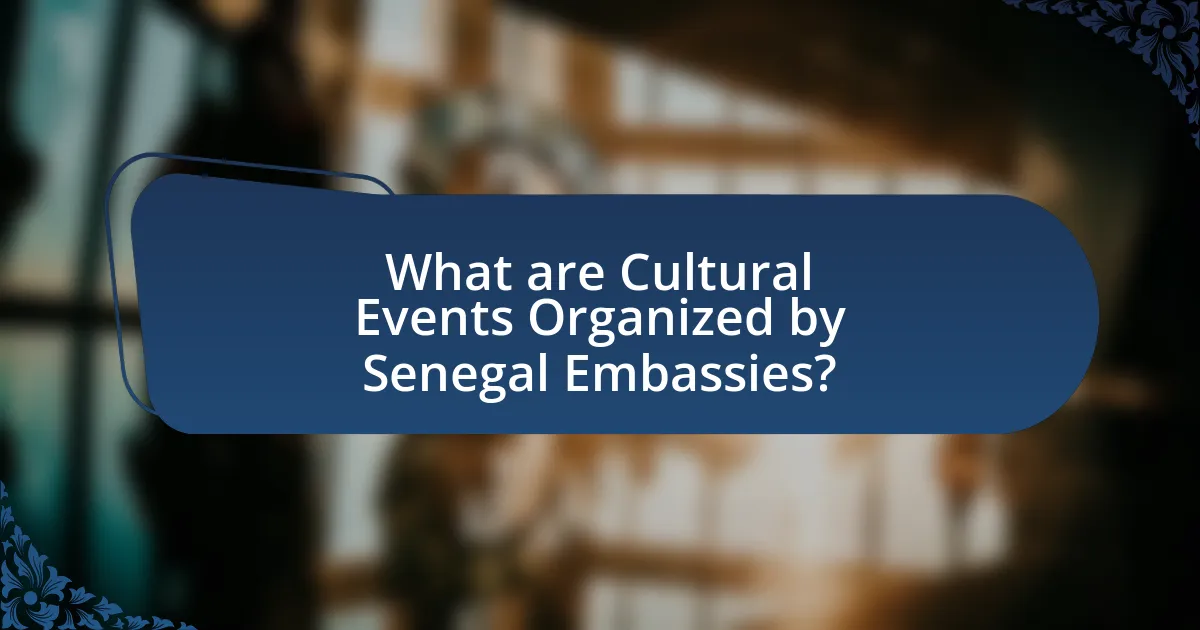
What are Cultural Events Organized by Senegal Embassies?
Cultural events organized by Senegal embassies include art exhibitions, music festivals, culinary showcases, and film screenings that promote Senegalese culture and heritage. These events aim to foster cultural exchange and strengthen diplomatic ties while engaging local communities in the host countries. For instance, the Senegalese embassy in Paris frequently hosts art exhibitions featuring contemporary Senegalese artists, which not only highlight the country’s artistic talent but also attract local audiences, thereby enhancing cultural understanding and appreciation.
How do these events reflect Senegalese culture?
Cultural events organized by Senegal embassies reflect Senegalese culture by showcasing traditional music, dance, art, and culinary practices that are integral to the nation’s identity. These events often feature performances of Senegalese music genres like mbalax, which highlight the importance of rhythm and community in Senegalese life. Additionally, the inclusion of traditional dishes emphasizes the significance of food in cultural expression and social gatherings. For instance, the preparation and sharing of meals during these events illustrate the communal values and hospitality that are central to Senegalese culture. Furthermore, art exhibitions displaying local crafts and visual arts provide insight into the historical and contemporary narratives of Senegal, reinforcing the cultural heritage and pride of the Senegalese people.
What types of cultural expressions are showcased in these events?
Cultural events organized by Senegal embassies showcase a variety of expressions, including traditional music, dance, visual arts, and culinary arts. These events often feature live performances of Senegalese music genres such as mbalax, which incorporates traditional rhythms and instruments, alongside vibrant dance displays that reflect Senegalese heritage. Additionally, visual arts are represented through exhibitions of paintings, sculptures, and crafts that highlight Senegalese culture and history. Culinary arts are also a significant aspect, with food tastings that introduce local dishes, emphasizing the rich flavors and ingredients unique to Senegal. These expressions serve to promote cultural understanding and appreciation within local communities.
How do these events promote Senegalese heritage?
Cultural events organized by Senegal embassies promote Senegalese heritage by showcasing traditional music, dance, and cuisine, which are integral aspects of Senegal’s cultural identity. These events provide a platform for local communities to engage with and experience Senegalese customs, fostering appreciation and understanding of the country’s rich history. For instance, events like the Dakar Music Festival highlight Senegalese artists and their contributions to global music, reinforcing the significance of cultural expressions in preserving heritage. Additionally, culinary showcases introduce traditional Senegalese dishes, such as thieboudienne, allowing participants to connect with the culture through food. This immersive experience not only educates attendees about Senegalese traditions but also strengthens cultural ties within the diaspora and promotes cultural exchange.
Why are these events important for local communities?
Cultural events organized by Senegal embassies are important for local communities because they foster cultural exchange and enhance social cohesion. These events provide opportunities for community members to engage with Senegalese culture, promoting understanding and appreciation of diversity. For instance, participation in cultural festivals can lead to increased tourism and local economic benefits, as seen in various studies indicating that cultural events can boost local businesses by up to 30%. Additionally, these gatherings often encourage collaboration among local organizations, strengthening community ties and creating a sense of belonging among residents.
What role do cultural events play in community engagement?
Cultural events play a crucial role in community engagement by fostering social cohesion and enhancing cultural awareness among diverse groups. These events provide a platform for individuals to connect, share experiences, and celebrate cultural heritage, which strengthens community bonds. For instance, studies have shown that participation in cultural activities can increase civic involvement and promote a sense of belonging, as evidenced by the findings of the National Endowment for the Arts, which reported that communities with vibrant cultural events experience higher levels of volunteerism and social interaction.
How do these events foster intercultural dialogue?
Cultural events organized by Senegal embassies foster intercultural dialogue by providing platforms for diverse communities to engage in shared experiences and discussions. These events often showcase Senegalese art, music, and cuisine, which invite local populations to explore and appreciate different cultural expressions. For instance, the Senegalese Independence Day celebrations include performances and workshops that encourage participation from various cultural groups, facilitating mutual understanding and respect. Research indicates that such interactions can lead to increased cultural awareness and reduced stereotypes, as evidenced by studies showing that exposure to different cultures enhances empathy and social cohesion among participants.
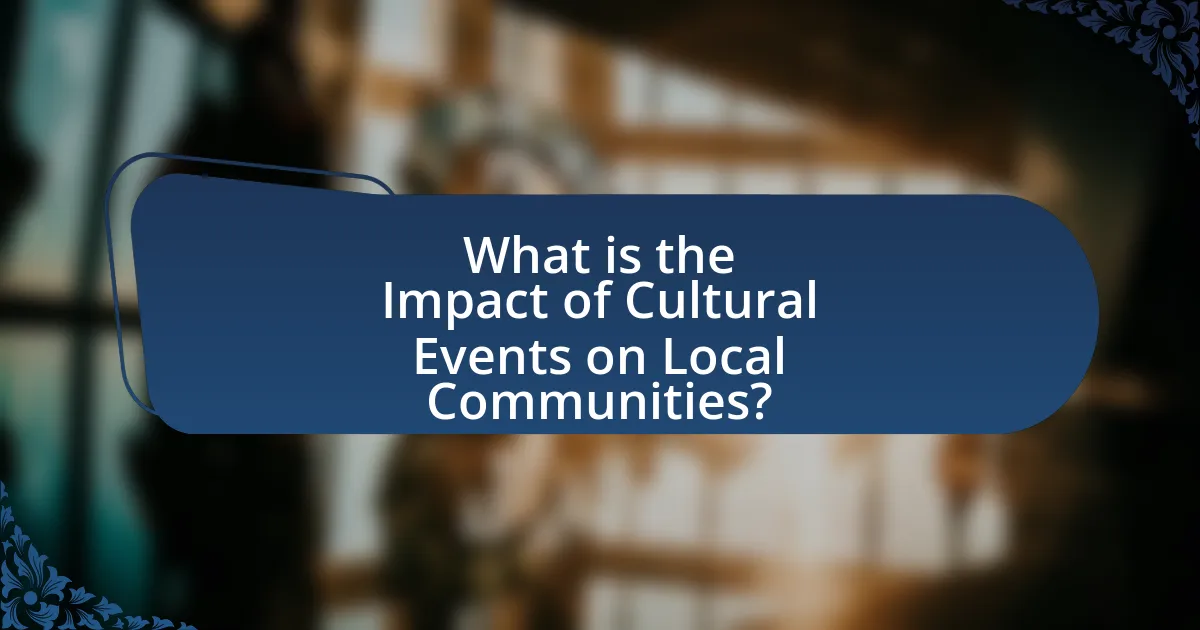
What is the Impact of Cultural Events on Local Communities?
Cultural events significantly enhance local communities by fostering social cohesion, promoting economic development, and preserving cultural heritage. These events create opportunities for community members to engage with one another, strengthening interpersonal relationships and community bonds. For instance, festivals organized by Senegal embassies often attract diverse audiences, leading to increased local tourism and business for vendors, which can boost the local economy. Additionally, cultural events serve as platforms for showcasing traditional practices and art forms, thereby contributing to the preservation of cultural identity. Research indicates that communities hosting cultural events experience a measurable increase in community pride and participation, as evidenced by studies conducted by the National Endowment for the Arts, which highlight the positive correlation between cultural activities and community engagement.
How do these events influence community identity?
Cultural events organized by Senegal embassies significantly influence community identity by fostering a sense of belonging and shared cultural heritage among participants. These events provide opportunities for individuals to engage with Senegalese traditions, music, and cuisine, which enhances cultural awareness and appreciation within the local community. For instance, the Senegalese Independence Day celebrations often include traditional dance performances and culinary showcases, allowing attendees to experience and connect with Senegalese culture firsthand. This engagement not only strengthens community ties but also promotes multiculturalism, as diverse groups come together to celebrate and learn from one another, thereby enriching the overall community identity.
In what ways do cultural events strengthen community bonds?
Cultural events strengthen community bonds by fostering social interaction and shared experiences among diverse groups. These events create opportunities for individuals to connect, collaborate, and celebrate their cultural heritage, which enhances mutual understanding and respect. For instance, festivals organized by Senegal embassies often showcase traditional music, dance, and cuisine, allowing community members to engage with Senegalese culture while also promoting inclusivity. Research indicates that participation in cultural events can lead to increased social cohesion, as evidenced by a study published in the Journal of Community Psychology, which found that communities with regular cultural activities reported higher levels of trust and cooperation among residents.
How do these events contribute to local pride?
Cultural events organized by Senegal embassies contribute to local pride by fostering a sense of community and cultural identity among residents. These events showcase Senegalese traditions, art, and cuisine, allowing local populations to engage with and celebrate diversity. For instance, festivals featuring Senegalese music and dance not only entertain but also educate attendees about Senegal’s rich heritage, enhancing appreciation for cultural diversity. Additionally, participation in these events often leads to increased collaboration among local organizations and residents, strengthening community bonds and instilling a sense of belonging.
What economic benefits arise from these cultural events?
Cultural events organized by Senegal embassies generate significant economic benefits for local communities. These events stimulate local economies by attracting tourists, which increases spending in hospitality, retail, and service sectors. For instance, a study by the World Tourism Organization indicates that cultural tourism can contribute up to 40% of total tourism revenue in some regions. Additionally, local businesses often experience increased sales during these events, leading to job creation and enhanced community engagement. Furthermore, cultural events can foster partnerships between local artisans and international markets, promoting the sale of local crafts and products, thereby boosting income for local creators.
How do cultural events stimulate local businesses?
Cultural events stimulate local businesses by increasing foot traffic and consumer spending in the area. When cultural events are organized, such as festivals or art exhibitions, they attract both locals and tourists, leading to higher patronage of nearby shops, restaurants, and service providers. For instance, a study by the National Endowment for the Arts found that cultural events can generate significant economic activity, with local businesses experiencing a revenue boost of up to 30% during such events. This influx of visitors not only enhances sales for businesses but also promotes community engagement and supports local artisans and vendors, thereby creating a vibrant economic ecosystem.
What is the impact on tourism in the area?
Cultural events organized by Senegal embassies significantly enhance tourism in the area by attracting both local and international visitors. These events showcase Senegalese culture, cuisine, and traditions, leading to increased foot traffic in local businesses and attractions. For instance, a study by the World Tourism Organization indicates that cultural tourism can contribute up to 40% of total tourism revenue in regions hosting such events. This influx of tourists not only boosts the economy but also fosters cultural exchange and community engagement, further solidifying the area’s appeal as a travel destination.
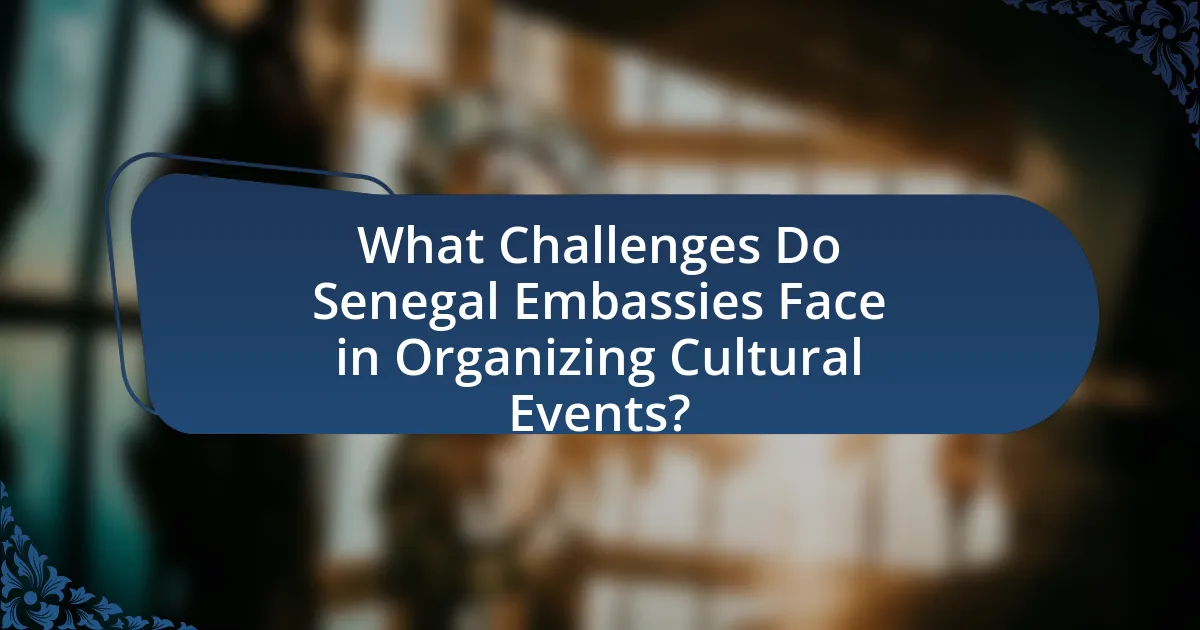
What Challenges Do Senegal Embassies Face in Organizing Cultural Events?
Senegal embassies face several challenges in organizing cultural events, primarily including limited funding, logistical issues, and cultural misunderstandings. Limited funding restricts the scope and scale of events, making it difficult to secure venues, materials, and promotional efforts. Logistical issues arise from coordinating with local authorities, managing event schedules, and ensuring adequate participation from the community. Cultural misunderstandings can lead to misinterpretations of Senegalese traditions and practices, potentially alienating local audiences. These challenges hinder the effectiveness of cultural events in fostering community engagement and promoting Senegalese culture abroad.
What logistical issues are commonly encountered?
Common logistical issues encountered in organizing cultural events by Senegal embassies include transportation challenges, venue availability, and resource allocation. Transportation issues arise when coordinating the movement of participants, equipment, and materials, often leading to delays. Venue availability can be problematic due to scheduling conflicts or inadequate facilities, which can hinder event execution. Resource allocation issues, such as budgeting constraints and staffing shortages, can also impact the overall success of the event. These challenges are frequently documented in event management literature, highlighting the importance of thorough planning and contingency strategies to mitigate such logistical hurdles.
How do funding constraints affect event planning?
Funding constraints significantly limit the scope and quality of event planning. When financial resources are restricted, organizers must prioritize essential elements, often leading to reduced venue options, fewer promotional activities, and limited participant engagement. For instance, a study by the National Endowment for the Arts indicates that events with higher budgets tend to attract larger audiences and offer more diverse programming, highlighting the direct correlation between funding and event success. Consequently, inadequate funding can diminish the overall impact of cultural events, such as those organized by Senegal embassies, on local communities.
What are the challenges in engaging local communities?
Engaging local communities presents several challenges, including cultural differences, communication barriers, and varying levels of community interest. Cultural differences can lead to misunderstandings and misinterpretations of the events being organized, making it difficult to connect with the community effectively. Communication barriers, such as language differences or lack of access to information, can hinder participation and engagement. Additionally, varying levels of interest among community members can result in unequal participation, where some groups may feel excluded or less motivated to engage. These challenges are supported by studies indicating that successful community engagement requires addressing these factors to foster inclusivity and participation.
How can these challenges be overcome?
To overcome the challenges faced by cultural events organized by Senegal embassies, strategic partnerships with local organizations can be established. These partnerships enhance resource sharing, increase community engagement, and improve event visibility. For instance, collaborating with local cultural institutions can provide access to venues and local expertise, which can lead to more successful events. Additionally, conducting thorough community needs assessments prior to event planning can ensure that the events resonate with local interests and cultural contexts, thereby increasing participation and support. Research indicates that events tailored to community preferences see higher attendance rates, as evidenced by a study published in the Journal of Cultural Economics, which found that culturally relevant programming significantly boosts local engagement.
What strategies can embassies employ to enhance community participation?
Embassies can enhance community participation by organizing cultural events that foster engagement and collaboration with local communities. These events can include art exhibitions, music festivals, and culinary showcases that highlight Senegalese culture, thereby attracting diverse audiences. By partnering with local organizations and community leaders, embassies can ensure that these events are relevant and accessible, which increases participation rates. Additionally, providing platforms for local artists and performers to showcase their talents during these events encourages community involvement and strengthens cultural ties. Research indicates that cultural events can significantly improve community cohesion and participation, as seen in various case studies where embassies successfully engaged local populations through targeted cultural initiatives.
How can partnerships with local organizations improve event success?
Partnerships with local organizations can significantly enhance event success by leveraging their established networks and community trust. Local organizations often possess deep insights into community needs and preferences, which can inform event planning and execution, ensuring relevance and engagement. For instance, a study by the National Endowment for the Arts found that events co-hosted with local entities saw a 30% increase in attendance compared to those organized independently. This collaboration not only boosts visibility but also fosters a sense of ownership among community members, leading to higher participation rates and positive feedback.
What Best Practices Should Be Followed for Successful Cultural Events?
Successful cultural events should prioritize community engagement, thorough planning, and effective promotion. Engaging local communities ensures that the events resonate with the audience, fostering participation and support. Thorough planning involves setting clear objectives, budgeting appropriately, and coordinating logistics to ensure smooth execution. Effective promotion through various channels, including social media and local partnerships, maximizes outreach and attendance. Research indicates that events with strong community involvement and strategic marketing see higher participation rates and positive feedback, reinforcing the importance of these best practices in achieving success.
How can effective marketing strategies enhance attendance?
Effective marketing strategies can enhance attendance at cultural events organized by Senegal embassies by increasing visibility and engagement within local communities. Targeted advertising, social media campaigns, and community partnerships can create awareness and generate interest, leading to higher turnout. For instance, a study by the National Endowment for the Arts found that effective marketing can increase event attendance by up to 30% when utilizing social media platforms to reach specific demographics. By leveraging these strategies, Senegal embassies can effectively attract larger audiences to their cultural events, fostering greater community involvement and appreciation for Senegalese culture.
What role does feedback play in improving future events?
Feedback is essential for improving future events as it provides insights into participants’ experiences and identifies areas for enhancement. By collecting feedback through surveys or discussions, organizers can understand what aspects of the event were successful and which elements need adjustment. For instance, a study by the Event Marketing Institute found that 70% of event planners use attendee feedback to refine their strategies, demonstrating the direct correlation between feedback and event improvement. This process not only enhances the quality of future events but also fosters stronger community engagement by addressing the needs and preferences of attendees.
